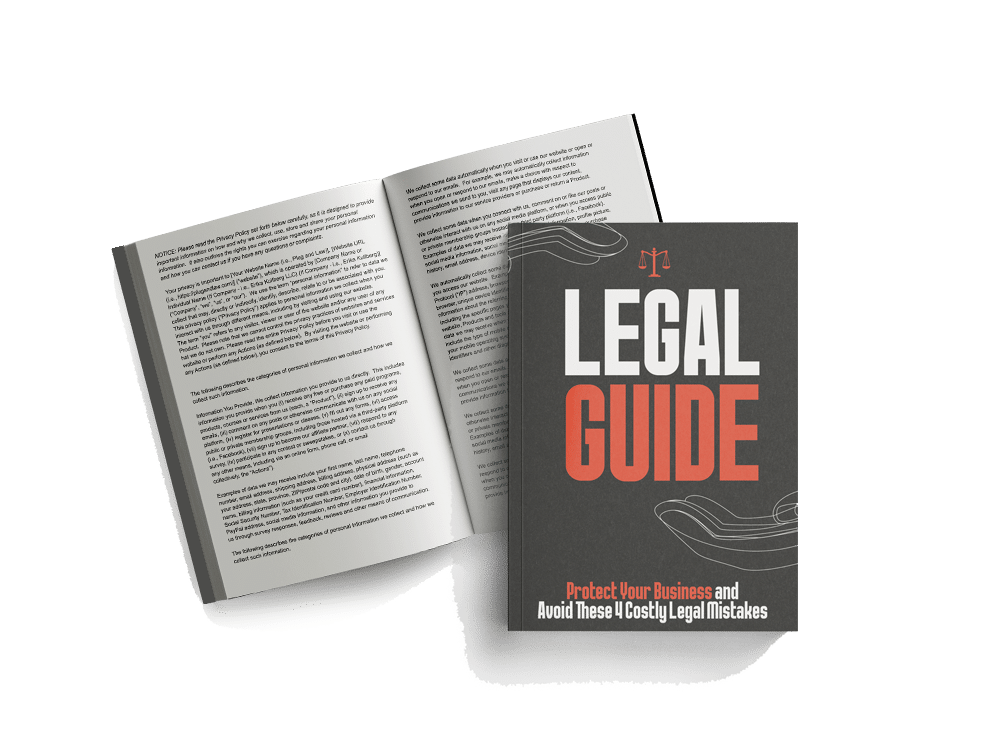Whether you are about to launch or already have a blog, website or online business, you’ve probably wondered how to legally protect it?
These are some of the questions you may be asking yourself:
- What is a privacy policy and do I need one?
- What are the best ways to legally protect my blog, website or online business?
- What are the consequences for not legally protecting my blog, website or online business?
- What’s the easiest way to legally protect my blog, website or online business?
As a blogger, entrepreneur, small business owner or online business owner, you are probably wearing many hats. That’s why, understandably, dealing with the legal stuff and making sure your blog, website or online business is legally protected has probably been sitting on your to-do list for far too long.
In this post, you’ll learn exactly how to legally protect your blog, website or online business.
Table of Contents
3 Essential Website Policies to Protect your Blog, Website or Online Business
The 3 essential website policies that you need for the website are a Privacy Policy (which must comply with various laws and regulations), Terms & Conditions and Disclaimer (which will also include your affiliate disclosures).
This applies whether you have a blog, an online business or any other website. To put it simply, if you have a website available to the public, you need these 3 website policies on your website (typically this is done as 3 separate pages that are hyperlinked in the footer of your website).
Ideally, you want to have these up on your website before you launch, to avoid any issues and to legally protect yourself from any fines or potential disputes or lawsuits. If you already have a website, blog or online business, you’ll want to get these up as soon as you possibly can.
How to Create Your Website Policies
Plug and Law
You can get your Privacy Policy, Terms & Conditions and Disclaimer with Plug and Law’s Legal Bundle.
Our legal agreements and policies are carefully crafted by top international lawyers to help you protect your business and comply with various laws and regulations around the world.
We also regularly track privacy laws and regulations, and if an update to your Privacy Policy is required, we will notify you via email of the required updates.
The "Do It Yourself" Approach
Many people attempt the “Do It Yourself” approach before they ultimately end up finding Plug and Law.
It’s tempting to want to take a “Do It Yourself” approach to these essential website policies.
- “Maybe I’ll just copy & paste the website policies from someone else’s website”
- “Maybe I’ll use free website policies that I find”
- “Maybe I’ll try to write my own legal pages by stringing together and rewording various versions I find online”
All of these ideas have serious flaws and potential consequences.
For one, it’s illegal to copy content from someone else’s website–and that includes their Privacy Policy, Terms & Conditions and Disclaimer. That would be copyright infringement, which can come with serious consequences.
Draft Your Own Website Policies
Many people try to draft website policies on their own.
The first problem here is that you’re going to spend hours and hours scouring the internet for different Privacy Policies, Terms & Conditions and Disclaimers to base yours off of. Then, it’ll take you many more hours reword everything to try to avoid getting flagged for copyright infringement. Your time is valuable and limited.
Now, after you’ve spent hours of your own time trying to draft these legal policies yourself, comes the bigger problem: you have NO idea if they will even legally protect you or if you did it correctly. For the Privacy Policy in particular (which is required by law), messing up or omitting even one thing could mean hefty fines.
Hire a Lawyer to Draft Your Website Policies
Why You Need Website Policies?
The benefit of getting a Privacy Policy, Terms & Conditions and Disclaimer at Plug and Law is that you’ll receive all 3 website policies at less than a fraction of the price you’d pay a top lawyer to custom draft them for you.
You Need a Privacy Policy
A Privacy Policy is not only essential for your website, it’s required by law. That means you could be breaking federal law by not having a privacy policy on your website.
Your website visitors need and have the right to know how their information is being collected and used, and what rights they have with respect to how their information is used and protected.
Having a Privacy Policy is also good business practice. The best way to show your visitors and customers that you take their privacy seriously is to have a thorough Privacy Policy on your website that complies with all of the various laws and regulations.
Without a privacy on your website, you could be breaking federal law.
Privacy laws are only going one direction–they are going to continue to get stricter, be enforced more frequently, and there will be new privacy laws enacted going forward.
The key points to understand about a Privacy Policy are that:
- It’s legally required
- It can come with hefty fines if you don’t have one
- It must comply with the General Data Protection Regulation (GDPR)
- It must comply with the California Consumer Privacy Act (CCPA)
- It must comply with other regulations and laws
- It must specify how you are collecting and using data, among other things
With Plug and Law’s Legal Bundle, the GDPR and CCPA compliance wording is included.
A Privacy Policy, among other things, should include the following bullet pointed items.
- A list of the data you collect, how you collect it and why you collect it
- The categories of third parties you share information with
- Information about tracking technologies you use
- How you retain data
- How a visitor can request changes or deletion of information
- How visitors are notified of changes to your privacy policy
- Visitors rights under the GDPR
- Visitors rights under the CCPA
- How you protect personal information
- How to contact you when there are questions about the privacy policy
You can purchase the Legal Bundle which includes all 3 legal policies: Terms & Conditions, Privacy Policy and Disclaimer.
You Need Terms & Conditions
Terms & Conditions are the rules of your website.
They dictate how your website can and can’t be used, among other things. You can think of them as the master rules–the Terms & Conditions incorporate the Privacy Policy and Disclaimer so that they all form one agreement.
Having Terms & Conditions on your website are very important, as they cover some critical points, such as:
- What your refund or exchange policy is for any products you sell, including physical products or online content or courses
- How your website can be used
- How legal disputes arising out of use of your website or any of the products you offer will be resolved
- What your intellectual property rights are, and what would constitute copyright infringement
- How your liability is limited–which is key to minimizing your liability in the event of a dispute or lawsuit
Without comprehensive Terms & Conditions on your website, you’re putting yourself at risk by opening yourself up to liability. That means someone could even come after you if they rely on content you have your website and have an unfavorable result. One of the key things that expertly-drafted Terms & Conditions for your website can offer is limiting your exposure to such liability.
You can purchase the Legal Bundle which includes all 3 legal policies: Terms & Conditions, Privacy Policy and Disclaimer.
You Need a Disclaimer
A Disclaimer is a statement that, among other things:
- Tells visitors of your website what you are and are not responsible for
- Limits your liability, including with regard to the content you publish on your website
- Ensures you are in compliance with Federal Trade Commission (FTC) regulations
- Provides transparency to visitors of your website about your relationship with certain third parties, including affiliates
- Disclaims liability for any information found through third party links contained on your website
- Provides transparency to visitors about testimonials on your website, in order to comply with FTC regulations
For blogs in particular, or any website with informational content, it’s important to include a disclaimer to limit your liability for when someone relies on information contained on your website. If, for example, someone relies on a post on your blog and suffers harm or injury, they could try to take legal action against you. A well-drafted disclaimer limits your liability in those worst case scenarios.
Without a disclaimer, besides opening yourself up to liability, you could also be found in violation of the FTC Act and be forced to give up any money you received in connection with your violation of the FTC Act.
You can purchase the Legal Bundle which includes all 3 legal policies: Terms & Conditions, Privacy Policy and Disclaimer.







